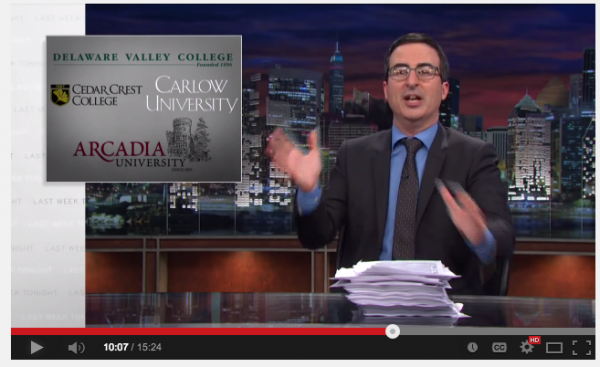I’ve said it before and I’ll say it again. Some of the best journalism in the United States is being done by comedians. Most recently it was Brit John Oliver who last week brought forth the wit and — get this — investigative reporting chops to expose America’s relic of a beauty pageant, Miss America, for vastly overstating its claims of being a scholarship competition.
Of course it’s funny. Seven minutes into the segment (below), you see a contestant’s posterior being sprayed with butt glue to prevent a bikini malfunction. “Just think about that for a second,” says Oliver. “‘How did the scholarship interview go?’ ‘Well my ass is still sticky. I think I’ve got it!’”
Then nine minutes in, Oliver reaches under his desk and pulls out a thick stack of IRS 990 forms for Miss America’s state organizations. Using information from the filings, he punctures the mothership’s claims that it provides $45 million annually for scholarships to women. Totting it all up, Oliver couldn’t even get to $4 million.
So how does Miss America overcount? By totting up every dollar reserved for scholarships — not just those actually awarded.
“For instance,” says Oliver. “Miss Pennsylvania’s website says it offers the winner scholarships to these four colleges, and the value of every single scholarship is counted together despite the fact that she is clearly going to attend, at most, one. Because she’s not going to attend four colleges. She’s not James f#!@king Franco.”
Meanwhile, in 2012, Miss Alabama took credit for $2.59 million in scholarships to one school, Troy College, calculated by multiplying the scholarship amount by 48, the number of potentially eligible pageant contestants. Oliver: “Even though, the actual number of contestants who accepted a scholarship that year was — and you are not going to believe this — zero. Absolute zero.”
Well, girls never were good at math, were they?
Actually, and this is just a little bit of a surprise, Oliver’s writing and research team — which he took pains to assemble in a gender-blind way — includes people like Liz Day, a Columbia Journalism School grad whose last job was with investigative reporting titan ProPublica.
“Liz is our former research director and an excellent reporter,” ProPublica editor-in-chief Stephen Engelberg told me by email. “She worked on a number of first-rate articles for us, including the dangers faced by cell tower workers and the lobbying by Turbo Tax against simplified, online filing. I love what John Oliver is doing and the fact that his show hired Liz suggests they want to do serious reporting in a comedic form — a cool idea. Oliver’s piece on net neutrality was also first rate, another example of how you can tell people something they need to know while cracking them up.”
ProPublica, for its part, has made its own forays into Oliver’s turf. Engelberg, presenting at the ASNE-APME conference in Chicago last week, proudly played a song commissioned for a project ProPublica did with This American Life and Planet Money about the 2008 financial meltdown.
Bet Against the American Dream from Alexander Hotz on Vimeo.
Seated next to Engelberg, and looking out at the crowd of mostly newspaper editors, I can tell you that about three quarters of the room was grinning. The others sat there as stony-faced as the heads on Mount Rushmore. As if the thing that might break the news business is humor.
It’s that quarter I’m worried about. Yes, newspapers will cover Miss America scandals (though it was upstart Jezebel that broke this week’s news that Miss America winner Kira Kazantsev was kicked out of her Hofstra sorority due to charges of abusive hazing). They’ll cover the obvious spectacle of an aging pageant set against a financially ailing city. They’ll write about the evening gown designer and the TV ratings. But who followed the money?
John Oliver followed the money.
I half-jokingly proposed the other day at a lunch with Montclair State journalism faculty that we teach a course on investigative journalism for comedy. That was before I found out about Liz Day. Now I’m serious.
Humor is the vernacular of our time. If you can harness it, as Oliver has, to illustrate such complex and abstract concepts as income inequality and net neutrality, you’re providing a real public service.
Given that people will pay for comedy these days, but expect to get news for free, it might even be what pays for investigative journalism in this country.
Debbie Galant is director of the NJ News Commons, a news consortium of more than 120 sites in the state. Every day it delivers a newsletter of top headlines about New Jersey from a variety of news sources. Subscribe here. The NJ News Commons is a project of the Center for Cooperative Media at Montclair State University.


